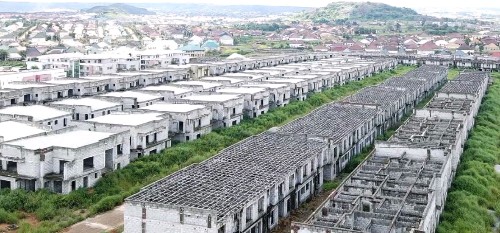The Federal Government has finalized plans to sell a large estate, reportedly linked to former Central Bank of Nigeria Governor Godwin Emefiele, to Nigerians in the low and middle-income brackets.
This substantial property, which includes 753 housing units, was recovered by the Economic and Financial Crimes Commission in December 2024.
According to the EFCC, this marks the largest single asset recovery since the agency’s establishment in 2003. The estate spans over 150,000 square meters and features various residential types, including duplexes and other apartments.
The recovery of the estate followed a final forfeiture order issued on December 2, 2024, by Justice Jude Onwuegbuzie of the Federal Capital Territory High Court in Abuja.
Court documents filed by the EFCC and obtained by our correspondent indicated a link between the property and Emefiele.
In April 2025, Emefiele attempted to reclaim the forfeited estate by approaching an FCT High Court.
He accused the EFCC of intentionally hiding the forfeiture proceedings from him, despite their frequent interactions regarding other ongoing charges.
However, his application was dismissed by the court.
On Tuesday, May 20, 2025, EFCC Chairman Ola Olukoyede officially handed over the 753 housing units to Ahmed Dangiwa, the Minister of Housing and Urban Development.
Speaking with Saturday Punch, Badamasi Haiba, the Director of Press and Public Relations at the Ministry of Housing, stated that the government, in line with President Bola Tinubu’s “Renewed Hope Agenda,” would ensure that ordinary Nigerians benefit.
He noted that the estate is still under construction. The ministry will first conduct structural and integrity assessments before deciding on the sales and allocation procedures.
“Next would be to profile the houses and decide how they will be sold to Nigerians. However, the intention of the minister has always been homeownership for all categories of Nigerians, including low and middle-income earners – so we should expect to see such intentions play out here, all-inclusive,” Haiba added.
Regarding the sales method, he mentioned that the ministry’s portal would be used, promising flexible payment options.
He said, “Homes sold by the ministry will always have flexible payment options, including mortgage, instalment, rent-to-own payment, etc., whether in this case or any other.
“These are just 753 units. The ministry has over 10,000 houses nearing completion nationwide under the Renewed Hope Housing Programme.
“The ministry has a web portal developed where sales of these houses are done – renewedhopehomes.fmhud.gov.ng. The minister has already stated that the same process will be adopted in selling these confiscated houses.”
When asked about the date the portal would open for interested Nigerians, he replied, “The Housing Ministry will first complete the houses. Construction was ongoing before the recovery by the EFCC.”
He dismissed speculations that the houses would be allocated to those in power.
Haiba said, “People will always speculate, maybe due to experiences from years ago. The present Renewed Hope administration is doing something different in promoting transparency and accountability.
“I can only tell you what the ministry is doing. With the renewedhopehomes.fmhud.gov.ng portal, the ministry has cut off human interference to ensure that the sales process is transparent and all-inclusive.
“Any Nigerian can sit in their home, log onto the portal, browse through the different types of units and locations, select the house they want, select a payment option, submit their application, and get an offer letter right there and then.”
- Estate Overtaken by Reptiles
A visit to the site by Saturday PUNCH revealed that the once-active construction site has fallen into disuse and neglect, with bushes growing over the uncompleted duplexes.
Overgrown bushes and reptiles, including snakes, have taken over a high-end residential estate in the Lokogoma area of Abuja.
Although security operatives guarding the property denied our correspondent access, a view from outside showed a site engulfed by thick foliage.
Additionally, another entrance had been covered by bushes.
Two security guards from neighboring estates reported killing snakes that had strayed into their compounds from the abandoned estate.
“When construction was ongoing here, there were nothing like snakes. But since they stopped work, snakes have been coming from that bushy estate. We’ve killed many,” they said.
The guards recalled that work on the estate ceased abruptly in July 2023.
“I am very sure they must have paid for everything needed to complete the construction before stopping. Everything moved at lightning speed. We never saw Emefiele in person, but we knew someone with serious money was behind it,” one of them said.
A check by our correspondent indicated that Emefiele’s legal troubles began in June 2023, when Department of State Services operatives arrested him in Lagos and flew him to Abuja.
Based on the guards’ comments, construction on the duplexes halted one month after the former CBN governor’s arrest by the DSS.
A tour of the estate from the outside showed it was completely fenced with a mix of concrete and block structures.
Furthermore, at least two of the duplexes appear completed, while others are at various stages of development, including plumbing and carpentry works.
Saturday Punch further observed that the estate is situated among at least five other high-value properties in the Lokogoma axis, further emphasizing the prime nature of the seized asset.
- Real Estate Experts Doubt Plan
Mr. Moses Ogunleye, a former President of the Association of Town Planning Consultants of Nigeria, expressed skepticism about the possibility of low-income earners benefiting from these houses.
He said, “If those properties have four bedrooms, I don’t think they can be for low-income earners. Is the Federal Government going to finish those structures before it sell them? If they are going to do so, low-income earners will not be able to afford them. If they want to give them to low-income earners as they are, the buyers are going to be spending a lot of money.”
“Maybe what they can do, in addition to the structural integrity test, is a cost analysis. I am not sure the roads have been done, or if water supply and electricity have been provided. What will make the estate habitable? Considering the value of land in that place, we can have an affordable housing development in that location, but it is not going to be a public support housing project. The total cost of completing it is going to be too expensive for low-income earners. I would say maybe middle-income earners may be able to afford it, but no real low-income earner would be able to.” These quotes highlight the potential financial barriers for low-income earners.
Stephen Eke, President of Fajiri Construction Limited, stated that while the government’s plan was “noble,” it was largely impractical.
He said, “This is given the high-end materials and premium construction standards typically associated with such properties. These estates are usually designed for luxury and exclusivity, making them structurally and financially incompatible with the affordability thresholds required for social or middle-income housing. Attempting to convert them for such purposes would either undermine their value or result in minimal cost reductions, defeating the goal of accessibility for the target demographic.”
“A more pragmatic approach would be to sell the estate at market value and channel the proceeds into a dedicated social housing fund. This strategy ensures that the high value of the seized property is fully realized and redistributed in a way that has a far greater impact. With the funds, government or development agencies can construct multiple units of affordable housing specifically designed for low and middle-income earners, using cost-efficient materials and designs suited to their needs. This model promotes equity, sustainability, and scale in addressing Nigeria’s housing deficit.
“The fund from the sale of Emefiele’s seized estate should be managed by a consortium of developers experienced in mass housing projects. This approach ensures that the resources are efficiently directed toward building affordable, large-scale housing designed specifically for low- and middle-income earners.”
Also, a former President, Nigerian Institute of Building and Pioneer National President, Building Collapse Prevention Guild, Mr Kunle Awobodu, said the valuation of the property needed to be done.
“Then, they will know whether it will be discounted or not. The government is getting the building almost free of charge, so it means that it is going to be subsidised because of the value of the land and the cost of materials presently.
“It was constructed not too long ago. The government should offer it at a subsidised rate. It should be gradual, like a mortgage. They should go and do a valuation of the buildings and internal calculations before they come out with the necessary prices.”
In the same vein, the Chief Executive Officer of Magnificent Choice Services Project and Engineering Ltd, Jeremiah Akinsele, said the seized estate should be sold strictly at its current market value, determined through a thorough evaluation by professional estate valuers whose reports set the price objectively.
He said, “Attempting to sell such high-value properties at discounted rates to low- and middle-income earners is unrealistic and prone to abuse, as it often leads to resale by wealthy individuals or politicians, undermining the original intent. Moreover, low-income earners simply do not have the financial capacity to purchase or maintain such expensive properties, considering the minimum wage in Nigeria is around N70,000, it is practically impossible for them to afford a plot of land or upkeep a luxurious estate in places like Abuja.
“Selling these estates at market rates ensures transparency and fairness while preventing distortions in the housing market. It also avoids burdening buyers with unsustainable management and maintenance costs that typically accompany high-end properties, costs that low-income earners are ill-equipped to handle. The proceeds from these sales can then be wisely reinvested into building affordable housing tailored specifically for low- and middle-income groups, where costs and designs align with their real financial realities.”
Credit: The Punch

 BIG STORY4 days ago
BIG STORY4 days ago
 BIG STORY5 days ago
BIG STORY5 days ago
 BIG STORY3 days ago
BIG STORY3 days ago
 BIG STORY4 days ago
BIG STORY4 days ago
 BIG STORY4 days ago
BIG STORY4 days ago
 BIG STORY3 days ago
BIG STORY3 days ago
 BIG STORY4 days ago
BIG STORY4 days ago
 BIG STORY4 days ago
BIG STORY4 days ago
























